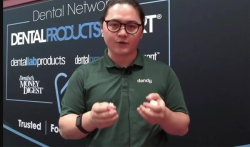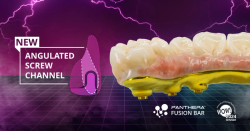- About Us
- Advertise
- Editorial
- Contact Us
- Terms and Conditions
- Privacy Policy
- Do Not Sell My Personal Information
© 2025 MJH Life Sciences™ and Dental Products Report. All rights reserved.
Digital Workflows Transform What Can Be Accomplished With Dental Implants
In his mainstage presentation during the 2023 American Academy of Implant Dentistry Annual Conference, Danny Domingue, DDS, FAAID, DABOI/ID, showed how the latest implant technology has helped him change the lives of his patients.
Patients with extreme oral health situations are common at the Lafayette, Louisiana, practice of Danny Domingue, DDS, FAAID, DABOI/ID, and through the use of technology, creativity, and his dedication to finding solutions, he is helping to change those patient’s lives.
A general dentist, Dr Domingue does much more than providing full arch restorations, but those complex cases were the focus of his mainstage presentation during the 2023 American Academy of Implant Dentistry (AAID) Annual Conference. While those cases can be complex, and each one requires some unique problem solving, Dr Domingue believes dentists have the tools necessary to deliver lasting solutions for those patients who need implant-retained full-arch restorations.
“It should not be stressful by any means,” he says.
Key Technologies
While showing off his implant workflow, Dr Domingue highlighted a number of technologies that play important roles in delivering optimal outcomes to patients. These technologies include digital impressions, CBCT scans, extraoral facescans, virtual articulators, digital treatment planning, 3D printing, and photogrammetry. Still, he relies on analog impression materials to capture specific details when the depth of a socket or the presence of too much blood makes his Medit intraoral scanner unable to deliver the detail and accuracy he needs to design the case.
Still, that intraoral scanner is an essential part of the process as he employs digital impressions and extraoral facescans to work out the proper bite for the patient at the start of his workflow. He then doesn’t have to focus on the bite and occlusion while designing the rest of the case.
These images can then be used to create a digital waxup and a smile visualization to show patients their potential treatment outcomes. Dr Domingue highlighted the importance of letting patients see what can be done at the outset as this can get them invested in pursuing and completing treatment.
“People are very visual, they want to see something,” he says.
When planning his implant treatments he uses BlueSkyBio software to plan the implant locations and then to design a custom surgical guide. During the presentation, Dr Domnigue showed how it takes him just 12 minutes to design a custom guide for an edentulous patient. Designed in several parts, and linked together with pins and magnets, the guide can be 3D printed in his practice, and he says this makes placing the implants simple.
After the implants are placed, he uses photogrammetry to verify position for passive fit of the full arch restoration. This information is sent to the lab to complete restoration design, and he says overlaying the follow-up CBCT scan onto his planned treatment is satisfying as it lets him see the accuracy of his treatment.
“It’s really cool to see your implant positions overlapped to your preop positions, just like you planned,” he says.
Focus on Patient Outcomes
After sharing his workflows and protocols, Dr Domingue discussed the importance of maintaining the gingiva even in full-arch restorations. He noted that for single implant cases, gingival management is a part of the workflow for most dentists, but it seems to be an afterthought when providing full-arch restorations.
The time for tissue management is while the patient is wearing the temporary restoration, he says. To ensure a healthy and proper gingival profile, Dr Domingue asks his lab to design the temporary to put some extra force on the gingiva which will help create a healthy gingival profile as the implants heal.
Another area where Dr Domingue says clinicians could be doing better is when it comes to designing hygienic full arch restorations. There should be no reason to remove a fixed full-arch implant restoration for a patient’s hygiene appointment, but many practices do this because the restorations have gaps or voids between the restoration and tissue that are difficult for patients to care for with the restoration fixed in place.
“I don’t take these out, because I don’t design them like that,” he says.
Dr Domingue says clinicians need to make sure not to design full arch restorations with cantilevers, or other unhygienic design features.
Beyond the Human Mouth
In the final segment of his presentation, Dr Domingue shared a pair of unique challenges he was able to solve with the same digital tools he uses with implant cases. In the first example, he shared the case of a patient who, along with needing dental treatment, was also missing an ear. Dr Domnigue demonstrated how he designed produced and surgically placed several implants with an attachment bar to hold the prosthetic ear in place in the same way fixed removable dentures are retained.
The second example focused on fowl patients, as a group of researchers studying duck behaviors came to him looking for ideas on how to make a better harness for the computers they attach to ducks and use for the research. Using the same technology he uses to design implant cases for his human patients, Dr Domingue walked through his process of developing a framework that can be affixed to a duck with implants and then provides a solid connection on which to mount the research equipment.
Related Content:



